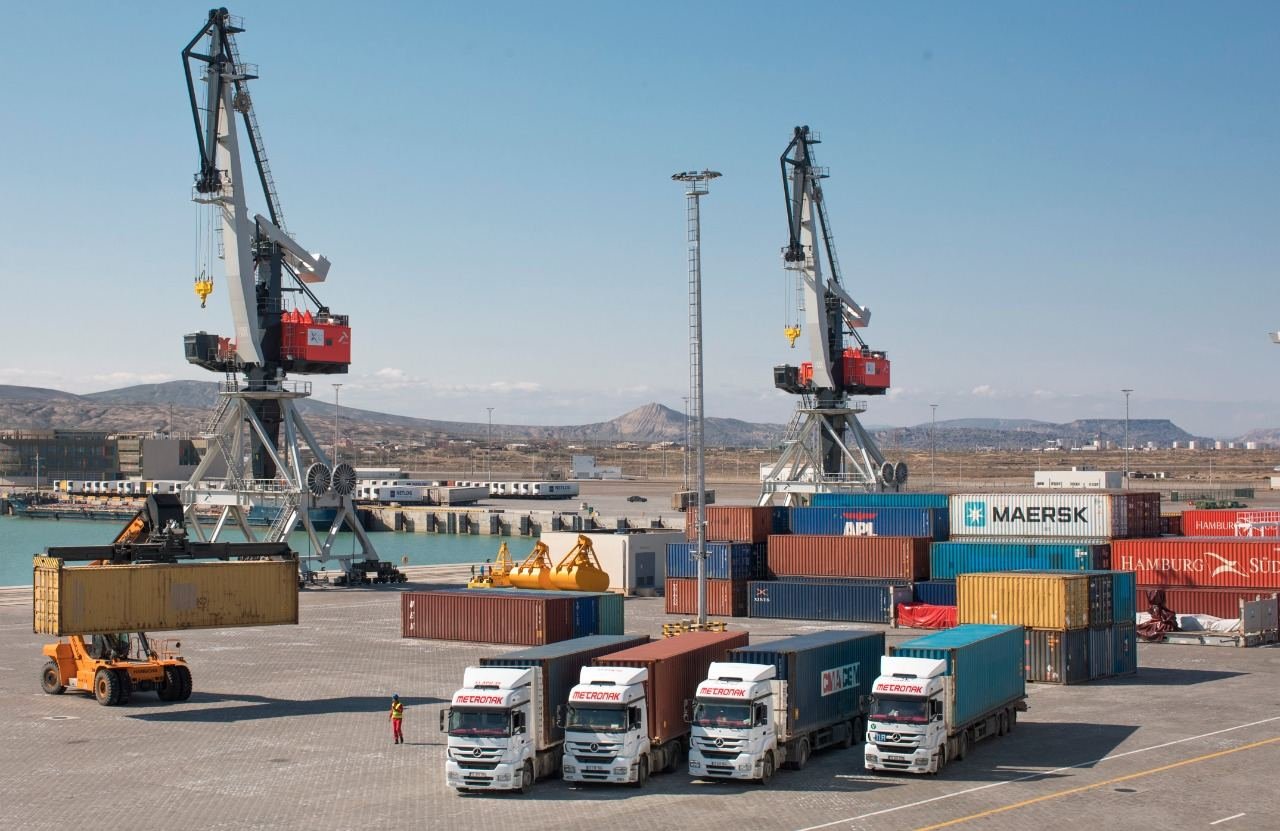Transit of international cargo through the territory of Azerbaijan under the United Nations-backed TIR customs system increased in the first six months of this year.
According to official data, the number of heavy vehicles transiting via Azerbaijan through the Baku International Sea Trade Port grew by 29.5 percent between January-June 2022 compared to the same period of last year, settling at 23,410 units. The round-trip cargo transportation was operated mainly between Europe, Türkiye, and Central Asia.
Khudayar Hasanli, the Head of Baku Port Strategic Planning and Development, said the Baku Port currently handles 20 percent of the overall transshipment of wheeled vehicles between Türkiye and Central Asia. According to him, Azerbaijan aims to increase this figure up to 50 percent, or nearly 60,000 trucks.
Currently, the overall annual transshipment of wheeled vehicles through Azerbaijan stands at roughly 40,000 units.
The Baku International Sea Trade Port is considered one of the region’s most advanced hubs of its kind with a cutting-edge technical and technological environment and all-inclusive infrastructure opportunities for logistics companies and port users. The largest maritime port in the Caspian Sea has a throughput capacity of up to 15 million tons of cargo, including 100,000 twenty-equivalent units (TEU). The port will ultimately be able to handle 25 million tons of cargo, including 500,000 TEU.
Amid the growing demand for routes passing through Azerbaijan, the Baku International Sea Trade Port is currently working to implement a number of projects to increase the transshipment of all types of cargo.
“Almost all participants in this process, in particular our port, Azerbaijan Railways, Azerbaijan Caspian Shipping Company, as well as other cargo carriers, carry out appropriate monitoring work to assess and develop infrastructure potential,” Hasanli said earlier this month in an interview with Trend.
As part of the work to expand the throughput of the Baku Port, its authorities also plan to put into operation a TIR park, as well as build terminals for transshipment of bulk cargo and mineral fertilizers.
The Baku International Sea Trade Port forms a vital part of the Trans-Caspian International Transport Route (TITR), known also as the East-West corridor. The intercontinental route runs from the Chinese Lianyungang seaport to the Chinese-Kazakh border, further through Kazakhstan, the Caspian Sea, Azerbaijan, and Georgia to Ukraine and Poland. Goods are transported by railway to the Kazakh seaports of Aktau and Kuryk and further sent to the Port of Baku in Azerbaijan by ships via the Caspian Sea. In Azerbaijan, containers are transported along the Baku-Tbilisi-Kars railway. The route further splits up into two with both leading to Europe — one of them passes through the Turkish cities of Mersin and Istanbul and the Mediterranean Sea, while the other one stretches to the Ukrainian city of Chernomorsk via the Black Sea.
Meanwhile, the authorities of the Baku Port signed last week a cooperation agreement with Albayrak Group, the leading Turkish construction, industry, and media group of companies. The document provides for joint activities at the “Ro-Ro” and fertilizer terminals in the port complex, creating the most comfortable and stable conditions for freight carriers in the logistics and supply chain, and ensuring more transit through Azerbaijan.
Under the deal, Albayrak Group will support an increase in the volume of cargo transported from Central Asian countries to Europe and Türkiye through Azerbaijan by attracting more cargo transit via the Baku Port, which will also contribute to creating new employment opportunities and adding value to the Azerbaijani economy.







 The number of evacuees from flooded areas in Kazakhstan has reached 97,852 people, including about 32,856 children since March 27.
The number of evacuees from flooded areas in Kazakhstan has reached 97,852 people, including about 32,856 children since March 27.
 The Islamic holy month of fasting, Ramadan comes to an end this week with the celebration of a joyous festival called Eid (meaning “festival” in Ar...
The Islamic holy month of fasting, Ramadan comes to an end this week with the celebration of a joyous festival called Eid (meaning “festival” in Ar...
 Iran's senior military leaders described the drone and missile attack on Israel on April 14 night as “successful".
Iran's senior military leaders described the drone and missile attack on Israel on April 14 night as “successful".
 Iranian President Ebrahim Raisi warned Israel that it would face a "real and extensive" response if it makes any "mistake" following Tehran’s missi...
Iranian President Ebrahim Raisi warned Israel that it would face a "real and extensive" response if it makes any "mistake" following Tehran’s missi...



